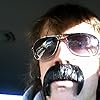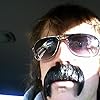Peter Derk
asked
Peter Derk:
from Yahoo! Answers: Suppose you want to write a science fiction story, just how much should you know about science? Just reading books or actually taking courses?
Peter Derk
Good question, and an unusual name!
Seriously, I'm not a total expert, but I feel like these questions are a good way to dole out some advice that people can take or leave.
When you're working on a story, the world is divided into two things. Working on the story and things that aren't working on the story.
Most of the time, it's pretty obvious which things are which. Eating a hot dog? Not working on the story. Typing on the story? Working on the story! Eating a slice of pizza wrapped around a hot dog? Not working on the story. Editing lines? Working on the story!
But. There are some things we can do to trick ourselves into feeling like we're working on the story without actually working on the story. For example, what if my story is about a hot dog eating contest? Then I'm doing "research" when I'm eating hot dogs.
Research is important if you're doing something like a military thriller, or writing a book like The Martian that tries to stay somewhat accurate in the details.
To a point, research is working on a story. And then it flips. You've done enough research, and research becomes something that's in the category of things that ARE NOT working on the story. See the aforementioned pizza/hotdog.
I was working on a story once about a strongman. Did you ever have those people come to your school who did feat of strength for Jesus? They would tear phone books, bend nails, break baseball bats and stuff? Anyway, there's a whole wealth of tricks on how to do that stuff, different feats, and training techniques. You can spend your whole life learning how to do that stuff, which some weirdos totally do, and that's a great way to fill your time with not working on your story.
Read up, but set yourself a deadline. No matter where you are when that deadline hits, start working on your story. And don't take a class. Seriously, unless your book hinges on a class of students doing something, then that's going to be a huge waste of time. You'll be reading things that have nothing to do with your story, you'll be studying for tests instead of working on your story. A class is definitely a whole heaping helping of not working on the story.
Hey, at some point, you have to say "Do I want to be a strongman or write a story about one?" If your answer is story, then you have to work on the damn story already, and nothing is going to replace the effort of applying ass to chair, fingers to keyboard, and time to story.
Seriously, I'm not a total expert, but I feel like these questions are a good way to dole out some advice that people can take or leave.
When you're working on a story, the world is divided into two things. Working on the story and things that aren't working on the story.
Most of the time, it's pretty obvious which things are which. Eating a hot dog? Not working on the story. Typing on the story? Working on the story! Eating a slice of pizza wrapped around a hot dog? Not working on the story. Editing lines? Working on the story!
But. There are some things we can do to trick ourselves into feeling like we're working on the story without actually working on the story. For example, what if my story is about a hot dog eating contest? Then I'm doing "research" when I'm eating hot dogs.
Research is important if you're doing something like a military thriller, or writing a book like The Martian that tries to stay somewhat accurate in the details.
To a point, research is working on a story. And then it flips. You've done enough research, and research becomes something that's in the category of things that ARE NOT working on the story. See the aforementioned pizza/hotdog.
I was working on a story once about a strongman. Did you ever have those people come to your school who did feat of strength for Jesus? They would tear phone books, bend nails, break baseball bats and stuff? Anyway, there's a whole wealth of tricks on how to do that stuff, different feats, and training techniques. You can spend your whole life learning how to do that stuff, which some weirdos totally do, and that's a great way to fill your time with not working on your story.
Read up, but set yourself a deadline. No matter where you are when that deadline hits, start working on your story. And don't take a class. Seriously, unless your book hinges on a class of students doing something, then that's going to be a huge waste of time. You'll be reading things that have nothing to do with your story, you'll be studying for tests instead of working on your story. A class is definitely a whole heaping helping of not working on the story.
Hey, at some point, you have to say "Do I want to be a strongman or write a story about one?" If your answer is story, then you have to work on the damn story already, and nothing is going to replace the effort of applying ass to chair, fingers to keyboard, and time to story.
More Answered Questions
About Goodreads Q&A
Ask and answer questions about books!
You can pose questions to the Goodreads community with Reader Q&A, or ask your favorite author a question with Ask the Author.
See Featured Authors Answering Questions
Learn more



